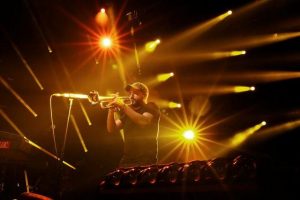
The nation’s political culture is as barren as a dry lake bed. Luckily we have better models.
Those of us who congratulate ourselves on the serious political issues we address may not be doing our mental health any favors. There are clearly risks to investing too much time in a news agenda that has largely been set by an incompetent Congress and a clueless White House. The issues matter, of course. But their public rhetoric is devoid of nuance and substance, a notable contrast to private lives filed with more generosity, acceptance of differences, and pleasure in the talents of others. They remind us that the nation’s political culture is as barren as a dry lake bed. When did our politics get so small? We need better models. Fortunately they are around us if we take time to look.
I’m always struck by the interpersonal richness that is all around especially in summer music festivals. Music re- energizes depleted bodies. And festivals seem to flourish everywhere, including the mainstays in Austin, Montreux, Southern Ontario and the Berkshires. What they all have in common is what our politics misses: a regard for different traditions, nationalities and sensibilities. Attend the jazz festival in stunning Montreux next to Lake Geneva and you will hear musicians from South Africa, Sweden, France, the US, Britain, Japan, the Caribbean, and Eastern Europe. The festival sometimes features a killer band of players from the Swiss Army (!) performing the arrangements of Count Basie and Quincy Jones. The freshness of these collaborations is as bracing as the air from the nearby Alps.
When did our politics get so mean and small?
Music does what our national politics can’t; it easily melds differences, synergizing them into something better. Music is transcendent. It makes differences irrelevant. I have a CD of the George Frideric Handel’s old war horse, Messiah. This familiar 18th Century oratorio was written by a German who lived in London and premiered the work in Dublin. My Swedish recording features a Japanese chorus with British singers: the same kind of crazy-wonderful mix of nationalities that would be familiar to both opera-goers and visitors to festivals in various corners of the world.
The quintessential Italian composer, Giaglomo Puccini couldn’t resist setting one of his operas in gold-rush era California. That landscape would later groom its own group of immigrant composers and eastern European musicians giving voice to the quintessential American art form of film. Franz Waxman (Poland) , Dimitri Tiomkin (Russia), and Miklós Rózsa (Hungary) were only the most visible members of an international group of composers and players that set up shop in Culver City. Who knew that one of the most “American” of films, Friendly Persuasion (1956), was scored by a Russian? The pattern continues, with music for recent films like La La Land (2016) with a score by Justin Hurwitz (Milwaukee) building on the influences of Michel Legrand (French) and Nino Rota (Italian). And for the record, the Prague, Czech, and the Royal Philharmonic have done definitive concert versions of many American film scores.
Of course music is non-stipulative; it evokes feelings more than the prescribed meanings of ordinary communication. We easily get tripped up when the world we articulate is not necessarily reflected in what others know. Even so, we need to embrace the virtues of pluralism and transcendence made possible by innovators who started life on the other side of our borders. Music is always a good place to look if we want to see how divisions are bridged. It offers the kind of cultural permeability we ought to cherish.
We are told “America First.” Why?